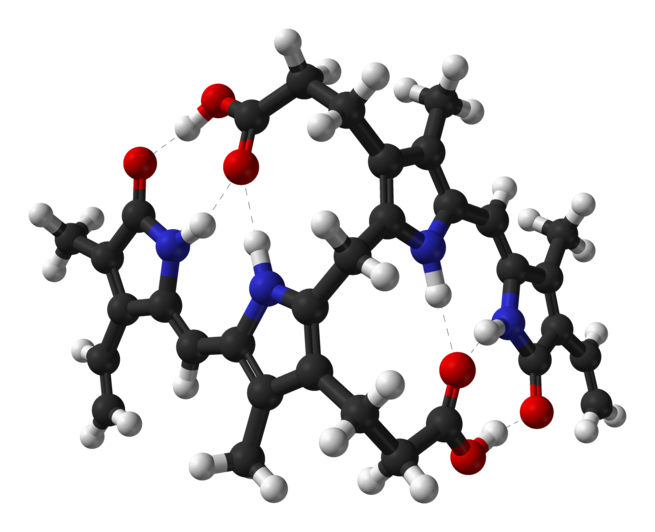Main Difference
The main difference between Bilirubin and Bile is that the Bilirubin is a chemical compound and Bile is a fluid produced by the liver of most vertebrates that aids the process of digestion
-
Bilirubin
Bilirubin is a yellow compound that occurs in the normal catabolic pathway that breaks down heme in vertebrates. This catabolism is a necessary process in the body’s clearance of waste products that arise from the destruction of aged red blood cells. First the hemoglobin gets stripped of the heme molecule which thereafter passes through various processes of porphyrin catabolism, depending on the part of the body in which the breakdown occurs. For example, the molecules excreted in the urine differ from those in the feces. The production of biliverdin from heme is the first major step in the catabolic pathway, after which the enzyme biliverdin reductase performs the second step, producing bilirubin from biliverdin.
Bilirubin is excreted in bile and urine, and elevated levels may indicate certain diseases. It is responsible for the yellow color of bruises and the yellow discoloration in jaundice. Its subsequent breakdown products, such as stercobilin, cause the brown color of faeces. A different breakdown product, urobilin, is the main component of the straw-yellow color in urine.
It has also been found in plants.
-
Bile
Bile or gall is a dark green to yellowish brown fluid, produced by the liver of most vertebrates, that aids the digestion of lipids in the small intestine. In humans, bile is produced continuously by the liver (liver bile), and stored and concentrated in the gallbladder. After eating, this stored bile is discharged into the duodenum. The composition of gallbladder bile is 97% water, 0.7% bile salts, 0.2% bilirubin, 0.51% fats (cholesterol, fatty acids, and lecithin), and 200 meq/l inorganic salts.Bile was the yellow bile in the four humor system of medicine, the standard of medical practice in Europe from around 500 BCE to the early 19th century. About 400 to 800 ml of bile is produced per day in adult human beings.
-
Bilirubin (noun)
A bile pigment that is a product of the breakdown of the heme portion of hemoglobin (which occurs within macrophages as they digest red blood cells), and which is responsible for the yellowish color seen in bruises. Extremely high levels of bilirubin may cause jaundice.
-
Bile (noun)
A bitter brownish-yellow or greenish-yellow secretion produced by the liver, stored in the gall bladder, and discharged into the duodenum where it aids the process of digestion.
-
Bile (noun)
bitterness of temper; ill humour; irascibility.
-
Bile (noun)
Two of the four humours, black bile or yellow bile, in ancient and medieval physiology.
-
Bile (noun)
A boil (kind of swelling).
-
Bilirubin (noun)
an orange-yellow pigment formed in the liver by the breakdown of haemoglobin and excreted in bile.

